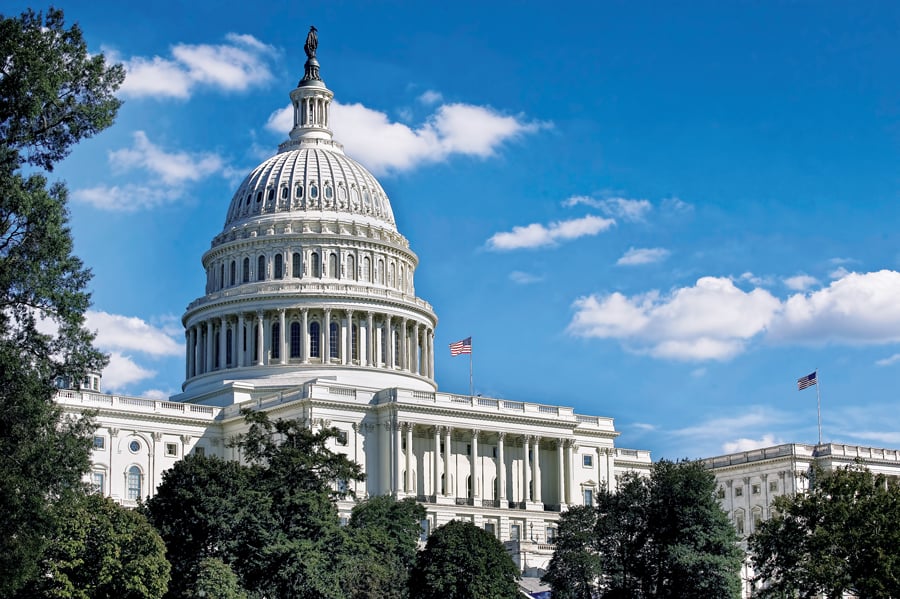

Congress has approved two major retirement savings bills over the last four years, and an insurance industry group representing annuities is counting on lawmakers to have an appetite for more.
Strong bipartisan majorities in the House and Senate passed the SECURE Act in 2019 and its successor, SECURE 2.0, in 2022. The two laws contained dozens of provisions to boost the number of Americans saving for retirement and increase their nest eggs.
The Insured Retirement Institute is taking to Capitol Hill this week about a dozen of its board members to advocate for retirement policy that didn’t make it into SECURE 2.0.
A bill at the top of IRI’s agenda is the Lifetime Income for Employees Act, which was introduced last week by Reps. Donald Norcross, D-N.J., and Tim Walberg, R-Mich. The legislation would allow retirement plan sponsors to include annuities with so-called delayed liquidity features among their qualified default investment alternatives.
Annuities can be QDIAs under current law, but they must be available for a plan participant to transfer or withdraw at least once in any three-month period. The Norcross-Walberg bill would open the door to less liquid annuities.
“It lifts the regulatory barrier that is preventing these higher-yield products from being offered in the QDIA,” said Paul Richman, IRI chief government and political affairs officer. “There’s no rational reason for it.”
IRI and its board members will meet with Senate Majority Leader Chuck Schumer, D-N.Y., House Minority Leader Hakeem Jeffries, D-N.Y., and Chair of the House Education and Workforce Committee Virginia Foxx, R-N.C., as well as lawmakers and staff from 16 other congressional offices.
“Our goal is within this session of Congress to move additional legislation that would strengthen and enhance the private-sector retirement system,” Richman said.
Lawmakers introduced a slew of retirement savings bills last year in hopes of getting them included in SECURE 2.0. Only those with the strongest bipartisan backing made the cut. Those that were left out had encountered some partisan resistance.
While the Lifetime Income for Employees Act has been reintroduced in the current Congress with bipartisan authors, it remains to be seen how much support it will garner across the aisle.
Annuities are often cited as complex investments with high fees that can harm investors if they’re not recommended properly, which can cause concern among some lawmakers.
Some financial professionals have the same qualms. James Watkins, managing member of InvestSense, a fiduciary oversight and litigation services firm, is skeptical about expanding the scope of annuities offered as QDIAs. He said investors may not grasp that they don’t have ready access to their money and the related potential harm.
“Anything that would further increase the illiquidity of a product should be an issue in terms of consumer protection,” Watkins said. “Investors aren’t going to understand the disadvantages of delayed liquidity.”
Richman stressed that the bill has just been unveiled. The congressional session runs until the end of next year, so there’s still plenty of time to build support.
TIAA also is a strong supporter of the bill.
“More retirement savers will have access to ‘pension-like’ annuities as part of their employers’ default retirement offerings, affording sustainable, guaranteed income throughout retirement,” Colbert Narcisse, chief product and business development officer at TIAA, said in a statement.
The IRI also is pushing a measure approved by the House Financial Services, 35-12, in May that would allow 403(b) retirement plans for teachers and other public workers to invest in collective investment trusts and unregistered insurance contracts.
Another idea for which IRI is trying to build support is requiring that businesses that don’t offer a retirement plan set up an auto-enrollment arrangement for their employees.
Rep. Richard Neal, D-Mass. and ranking member of the House Ways and Means Committee, has introduced such legislation in past Congresses and is likely to do so again in the current session. In the past, the bill has drawn opposition from Republicans, who see it as a burdensome mandate on small businesses.
“We’re continuing to talk to both sides of the aisle in both [the House and Senate] about that bill and why it’s needed,” Richman said.

Rajesh Markan earlier this year pleaded guilty to one count of criminal fraud related to his sale of fake investments to 10 clients totaling $2.9 million.

From building trust to steering through emotions and responding to client challenges, new advisors need human skills to shape the future of the advice industry.

"The outcome is correct, but it's disappointing that FINRA had ample opportunity to investigate the merits of clients' allegations in these claims, including the testimony in the three investor arbitrations with hearings," Jeff Erez, a plaintiff's attorney representing a large portion of the Stifel clients, said.

Chair also praised the passage of stablecoin legislation this week.

Maridea Wealth Management's deal in Chicago, Illinois is its first after securing a strategic investment in April.
Orion's Tom Wilson on delivering coordinated, high-touch service in a world where returns alone no longer set you apart.
Barely a decade old, registered index-linked annuities have quickly surged in popularity, thanks to their unique blend of protection and growth potential—an appealing option for investors looking to chart a steadier course through today's choppy market waters, says Myles Lambert, Brighthouse Financial.
